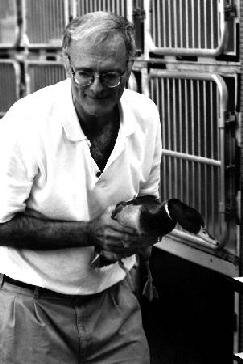
Board of Directors:
Acting President
Sandra Skolnikk
Treasurer
Martha Kudlacik
Secretary
Beth Visbeck
Director at Large
Lori Isakson
Director at Large
Jeanne Fouts
Clinical Advisor
Susie Brain
The Rescuer is published 3 times per year. We welcome articles, story ideas and suggestions.
Editor:
Michele Mandell
Contributors:
Jeanne Fouts
Benedicte Last
Martha Kudlacik
Brad Milliken
Sandra Skolnik
Nancy Tantzen
The Rescuer
Volume XXIV -- Issue Three -- November 1998
SUCCESS STORY: Getting Our Ducks in a Row
by Martha Kudlacik
 |
A male mallard duck suffering from avian botulism is readied for tube feeding by dedicated volunteer David Bushnell |
Ducks--lots of them--sick and dying. For the first time in years, avian botulism struck the South San Francisco Bay. Botulism is a devastating disease afflicting ducks and shorebirds, who ingest the botulisum toxin while feeding in shallow waters in warm weather. The disease does not infect humans, but it certainly has impacted the dedicated humans who work at Wildlife Rescue. As of this writing, we have received 270 ducks and shorebirds and are expecting more to be brought in by the San Francisco Bay Bird Observatory, US Fish and Wildlife Service and the Sunnyvale Water Treatment Plant.
The evening feeders of September 25 got a crash course in botulism treatment when 41 birds from Alviso were brought in by Clinical Adviser Susie Brain. Nearly every basket and carrier was required to house the sick birds on bedding of shredded newspaper, cloth and paper towels. As each bird was removed from its transport box, it was identified, registered, evaluated and tubed with fluids to begin flushing the toxin from its system. Many of the birds were so paralyzed that they could not blink, and they needed their eyes to be misted to prevent drying.
The ducks required this series of treatments every half hour for the first several hours after admission. With so many ducks, volunteers found that by the time they finished a round of tubing, misting, cleaning and charting, it was time to start over again!
Often compared to a MASH unit, this scene has been repeated many times since we received our first sick ducks. The experience has fostered team spirit among the volunteers who cheerfully tube and tend our quacking charges. We couldn't do it without the knowledge of our longtime volunteers who fought this disease in the '80s, and our current volunteers: Debbie Schide, Duck Team Leader, Kappy Sprenger, Waterbird Team Leader, Kathy Tyson and Becky Duerr, Animal Care Coordinators, and Susie Brain.
Thanks also to the local wildlife agencies who helped by taking many of the birds after they were stabilized: Peninsula Humane Society, WildCare, International Bird Rescue and Research Center, SPCA of Monterey, The Lindsay Museum, Sulphur Creek Nature Center and Wildlife Center of Silicon Valley; and the intrepid Lori Isakson and Martha Kudlacik, who drove to all points of the Bay Area to make the deliveries.
This is a true success story--some of the birds have already been released, and we expect many more to follow. To learn more about botulism, visit http://www.emtc.nbs.gov/http_data/nwhc/news/botpop.html
Speaker Training: We need volunteers who can spend at least three to four hours per month educating the community. We will hold a Speaker Training Class on Saturday, November 21 from 10am to noon. Please call (650)494-7417.





 Next Issue
Next Issue